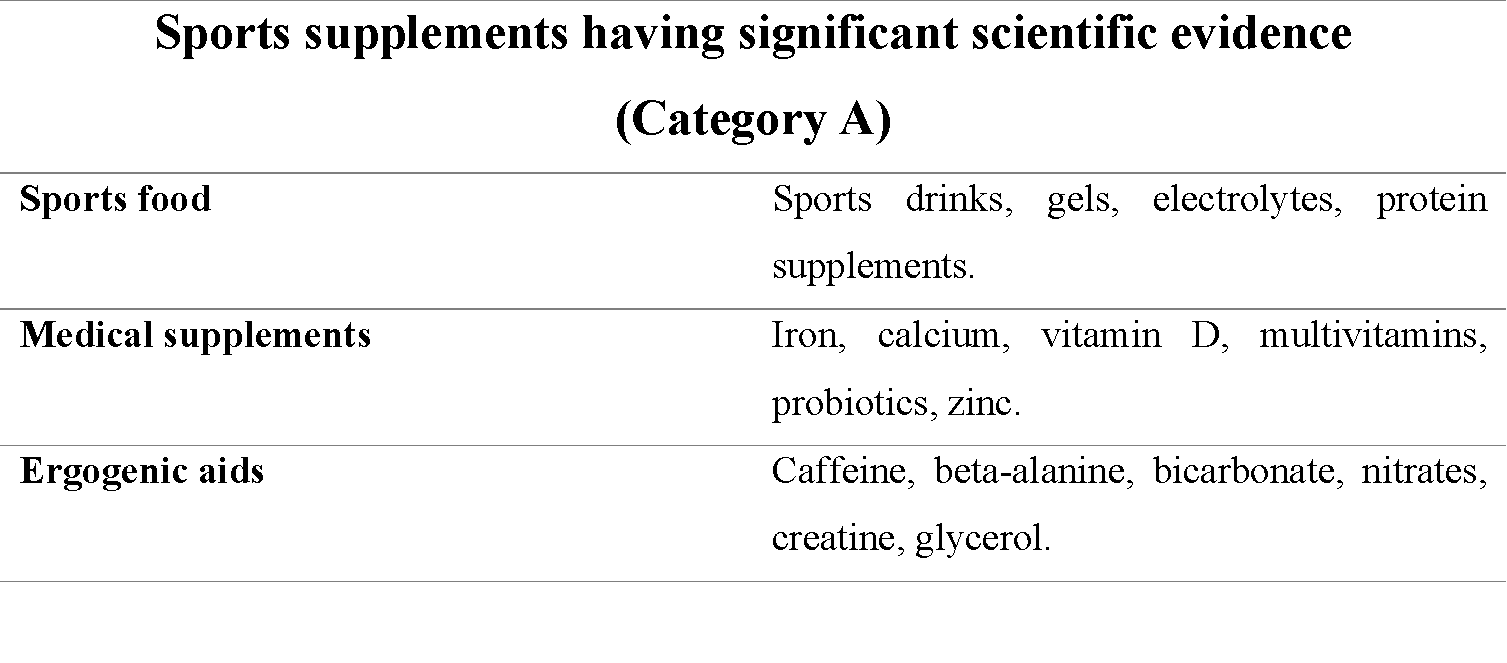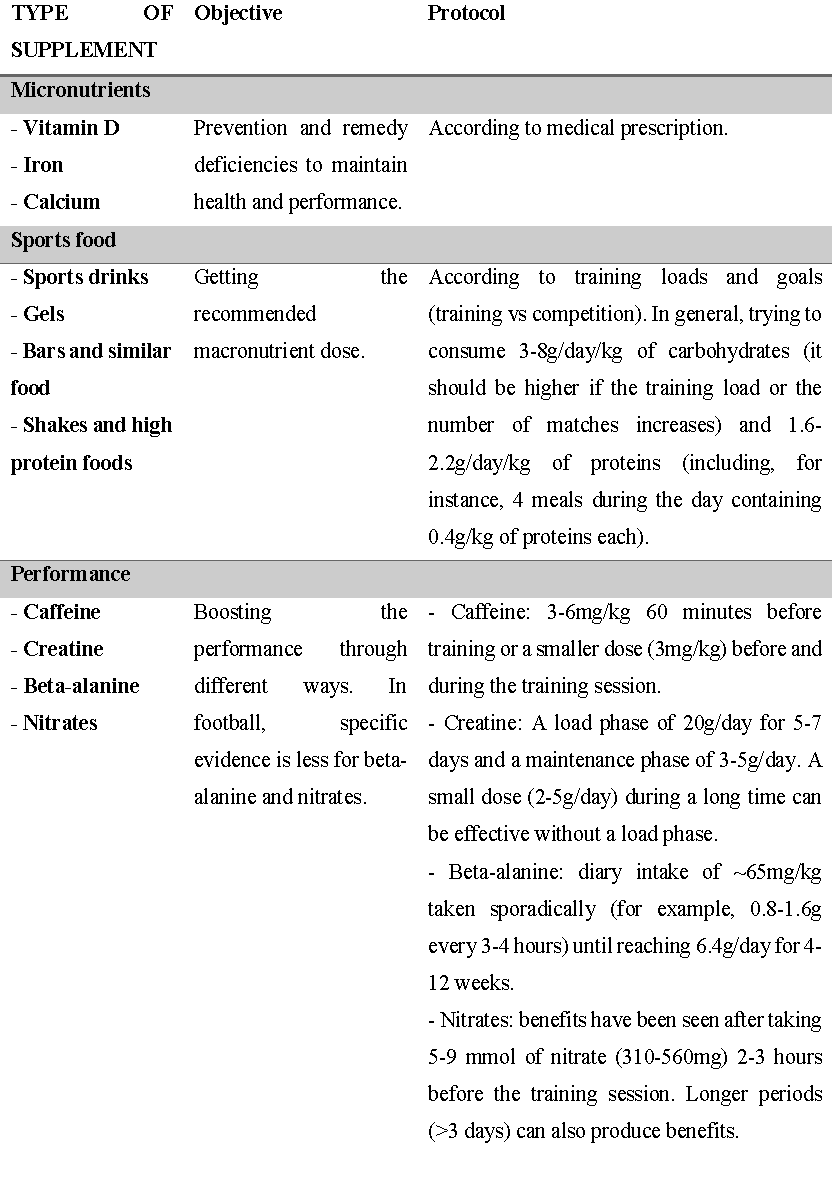Although training is the cornerstone of football players’ performance, nutrition is also important. An adequate nutrition plan will play a principal role in enabling athletes to handle training loads, to easily keep up with changes in their training schedule and to improve performance on match days. In relation to nutrition, dietary supplements—understood as the extra nutrient intake or food consumption in a daily diet with the aim of improving performance or health— has grown in importance in recent years. In regard to football, it is estimated that more than 90% of athletes take dietary supplements, the most usual ones being sports drinks and vitamins.1 On the other hand, a research done during the 2002 and 2006 World Cups has shown that the estimated prevalence was 43%, probably because sports drinks are not considered supplements.2
Nevertheless, there is considerable controversy over which dietary supplements have been scientifically proven to be useful or not, and in some cases, they have more of a marketing stunt than science. For instance, the Australian Institute of Sport has made a list classifying supplements according to the scientific evidence that proves they are useful and safe for consumption.3 Some of them were classified into category A, in which there are supplements approved by scientific research. Others were classified into category B, in which there are supplements that may have benefits but have not been investigated yet, whereas others were classified into category C, in which there are supplements that do not have any benefits or there is not enough evidence to say so. Finally, those supplements that are not recommended and may be banned or pose a big risk of contamination were classified into category D. As it can be observed in Figure 1, there are few supplements having significant scientific evidence in order to support their daily use.

In addition, there is even less scientific evidence for some supplements within elite football. In this context, the UEFA’s panel of experts (in which the responsible for the nutrition department at FC Barcelona, Dr Antonia Lizarraga, together with other coaches, scientists, doctors, nutritionists and professionals in sports have taken part), they’ve developed a consensus published in the prestigious British Journal of Sport Medicine stating that some supplements may have more substantial evidence supporting its use for football players.4
As the authors suggest, athletes should prioritise food over supplements which are taken with the only aim of accomplishing specific objectives regarding health or performance. In this sense, there are some supplements that can be recommended in certain occasions and that have the scientific evidence confirming its use, which is also summarised by the International Olympic Committee consensus on this topic (see Table 1 for a summary of the dietary supplements that can be advisable to take for football players in case they are not capable of meeting the requirements when following a daily diet).5 For example, in some occasions, football players can have certain micronutrient deficiencies such as vitamin D, calcium and iron. In these situations, supplementing with these micronutrients which are safe for health can be convenient—unless doses are administered chronically or in great amounts, as is the case with Iron6—although it is ideal to using a renowned and reliable brand and receiving therapeutic doses during the shortest possible period of time.

On the other hand, although taking all the necessary nutrients following a normal diet should be top priority, on many occasions, this is particularly difficult to achieve for football players’ (for example, when they have to attend several training sessions which makes food intake between them difficult to digest). Therefore, it is advisable to supplement with “sports food”, i.e., electrolyte and carbohydrate drinks, gels, bars, or recovery drinks, among others.
Moreover, many dietary supplements can be effective and boost sports performance, although, as the authors of the consensus state, not much research has directly examined the effects produced by these supplements on performance, especially in football; needless to say, they have not examined the effects produced in professional football players yet. However, as evidence shows in other sports, supplements such as caffeine or creatine can be advisable to take as an ergogenic aid, and others such as beta-alanine or nitrates have less evidence but can also be very effective.
Lastly, we must not forget that the use of dietary supplements can also presents some risks. In addition to the possible adverse effects of some supplements, it has been observed that some can contain possible substances not mentioned on the label or banned in sport or can even heighten the risk of these effects. In fact, in several studies on hundreds of dietary supplements, it was found a high prevalence (15-25%) of substances not mentioned on the label and banned in sports such as steroids.7,8 This is the reason why it is important to choose to buy dietary supplements from reliable companies and that have ensured independent quality controls of their products (such as the Informed Sport programme which proves the absence of banned substances in supplements).
Conclusions
Even though athletes must try to ideally fulfil the dietary requirements following their daily diet, it is advisable to take supplements in some cases so as to prevent or remedy micronutrient deficiencies (such as calcium, iron, vitamins) with the aim of taking the recommended macronutrient dose (such as proteins or carbohydrates), handling training loads and to boost performance (for example, through caffeine or creatine). However, it is important to take into account that many supplements lack scientific evidence, especially in football, and that they sometimes pose a risk of containing substances not mentioned on the label or banned in sport that could produce adverse effects. Therefore, a detailed control of the athletes’ supplementation will be fundamental regarding the type of supplement taken, its duration and the dose.
Pedro L. Valenzuela
References
- Aljaloud SO, Ibrahim SA. Use of dietary supplements among professional athletes in Saudi Arabia. J Nutr Metab. 2013;2013. doi:10.1155/2013/245349
- Tscholl P, Junge A, Dvorak J. The use of medication and nutritional supplements during FIFA World Cups 2002 and 2006. Br J Sports Med. 2008;42(9):725-730. doi:10.1136/bjsm.2007.045187
- AIS Sports Supplement Governance Committees. Australian Institute of Sport Position Statement: Supplements and Sports Foods in High Performance Sport. 2021;(March).
- Collins J, Maughan RJ, Gleeson M, et al. UEFA expert group statement on nutrition in elite football. Current evidence to inform practical recommendations and guide future research. Br J Sports Med. 2020:1-27. doi:10.1136/bjsports-2019-101961
- Maughan RJ, Burke LM, Dvorak J, et al. IOC consensus statement: Dietary supplements and the high-performance athlete. Br J Sports Med. 2018;52(7):439-455. doi:10.1136/bjsports-2018-099027
- Mettler S, Zimmermann MB. Iron excess in recreational marathon runners. Eur J Clin Nutr. 2010;64(5):490-494. doi:10.1038/ejcn.2010.16
- Geyer H, Parr MK, Mareck U, Reinhart U, Schrader Y, Schänzer W. Analysis of Non-Hormonal Nutritional Supplements for Anabolic-Androgenic Steroids – Results of an International Study. Int J Sports Med. 2004;25(2):124-129. doi:10.1055/s-2004-819955
- Martínez-Sanz JM, Sospedra I, Ortiz CM, Baladía E, Gil-Izquierdo A, Ortiz-Moncada R. ¿Dopaje intencionado o no? Una revisión de la presencia de sustancias dopantes en los suplementos dietéticos utilizados en el deporte. Nutrientes . 2017; 9 (10): 1-22. doi: 10.3390 / nu9101093
KNOW MORE
CATEGORY: MARKETING, COMMUNICATION AND MANAGEMENT
This model looks to the future with the requirements and demands of a new era of stadiums, directed toward improving and fulfilling the experiences of fans and spectators, remembering “feeling” and “passion” when designing their business model.
CATEGORY: FOOTBALL SPORTS PERFORMANCE
Through the use of computer vision we can identify some shortcomings in the body orientation of players in different game situations.
CATEGORY: MEDICINE HEALTH AND WELLNESS
A health check must detect situations which, despite not showing obvious symptoms, may endanger athletes subject to the highest demands.
CATEGORY: FOOTBALL TEAM SPORTS
In the words of Johan Cruyff, “Players, in reality, have the ball for 3 minutes, on average. So, the most important thing is: what do you do during those 87 minutes when you do not have the ball? That is what determines whether you’re a good player or not.”
CATEGORY: MEDICINE HEALTH AND WELLNESS SPORTS PERFORMANCE
Muscle injuries account for more than 30% of all injuries in sports like soccer. Their significance is therefore enormous in terms of training sessions and lost game time.
DO YOU WANT TO KNOW MORE?
- SUBSCRIBE
- CONTACT
- APPLY
KEEP UP TO DATE WITH OUR NEWS
Do you have any questions about Barça Universitas?
- Startup
- Research Center
- Corporate